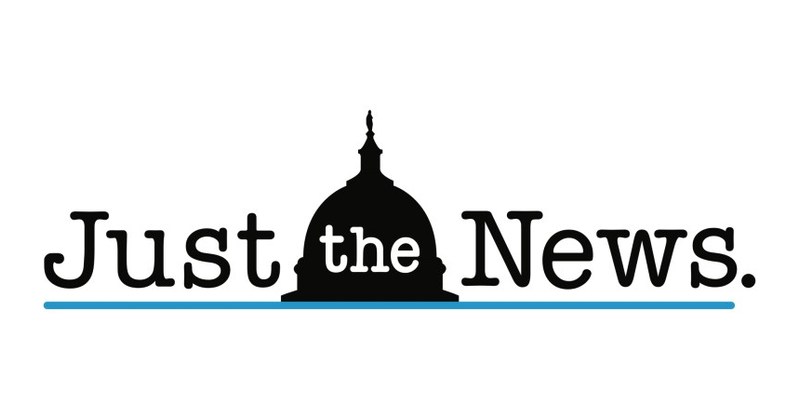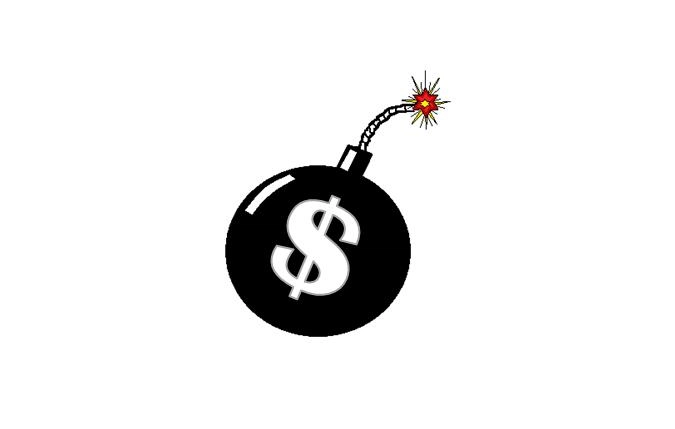May 31, 2022
Permission to republish original opeds and cartoons granted.
$30.4 trillion national debt, strong dollar underscore perils of world’s reserve currency as treasuries rally
By Robert Romano
The combination of the $30.4 trillion national debt and the strong dollar underscore both the advantages and the perils of the U.S. dollar’s so-called “exorbitant privilege” as the world’s reserve currency.
That is, when the economy is in turbulent waters and a recession appears to loom, financial institutions and central banks all over the world will tend to jump into U.S. treasuries in a flight to safety, as they are doing now.
Consider 10-year treasuries, where despite 8.3 percent consumer inflation and 11 percent producer inflation for the past twelve months, remarkably, rates have been falling, from about 3.12 percent in early May to about 2.8 percent now as of this writing as financial markets have been roiled by the simultaneous supply chain crisis pressures, the sagging U.S. economy and the war in Ukraine.
This ultimately pushes U.S. interest rates down, and the Federal Reserve will tend to follow suit in cutting rates once a recession has been realized. In recent years, since the financial crisis, this practice has also been accompanied by steady purchases of U.S. treasuries to keep rates low.
This in turn makes it cheaper to finance the U.S. national debt, especially through massive government spending. This year, the White House Office of Management and Budget projects the deficit will top another $1.4 trillion for 2022, after record $3.1 trillion and $2.77 trillion deficits in 2020 and 2021, respectively.
And so, why would Congress ever want to cut spending? All leaders in Washington, D.C. have to do is keep the spigots on, creating an ever-larger supply of marketable U.S. treasuries in order to keep their perpetual money machine working.
It’s a perverse incentive. Just watch when the next recession strikes. Once the unemployment rate starts rising, the pressure will similarly increase for Congress to stimulate the economy with more spending. In some ways, it won’t even need to, since revenues take a hit during recessions anyway, and so, the deficit — and thus demand for treasuries — tends to rise all on its own.
In years past, and even after the financial crisis, which saw Congress expend some $700 billion for the Troubled Asset Relief Program and then another $900 billion for the Obama stimulus, rampant inflation was avoided when control of the House switched to Republican control in 2010. This set the stage for a battle over increasing the debt ceiling, which then-House Speaker John Boehner (R-Ohio), with backing from Tea Party Republicans who were elected that year, was able to secure a deal on budget sequestration.
It worked. The deficit had peaked at $1.4 trillion in 2009, and by 2015, it had dropped to just $441 billion, just by essentially freezing defense and non-defense discretionary spending via budget sequestration.
The same thing might happen in 2023, with President Joe Biden being a potential beneficiary of tapping on the brakes fiscally. Readers will recall that in 1994 and 2010, Democratic Presidents whose Congress’ had overstepped lost control of one or both houses of Congress, only to go on to be reelected in 1996 and 2012, respectively.
Voters tend to favor mixed government at times as a means of mitigating each of the parties’ excesses, especially runaway presidential administrations that appear out of control. That factor will favor Republicans in 2022, where the GOP still leads Democrats in the Real Clear Politics average of polls in the Congressional ballot by 1.9 points, 46 percent to 44.1 percent.
Here and now, the American people appear to be saying, it’s time for a change.
Should Republicans prevail in November, as is likely in a midterm cycle with the GOP out of power, once gridlock sets in again in Washington, D.C. in 2023, and spending slows down, should the supply chain crisis be resolved and inflation comes down, the public’s desire for mixed government might subsequently work against Republicans in 2024.
On the other hand, should the supply chain crisis worsen and economic turmoil carries over into 2023 and beyond, a repeat of the 1970s and early 1980s’ stagflation, all bets could be off for Biden in 2024, should he even run again. Weakness is provocative, and so something to watch for will be primary challenges that could ultimately push an old president who ran out of luck — out of power — as happened to Lyndon Johnson in 1968. Stay tuned.
Robert Romano is the Vice President of Public Policy at Americans for Limited Government Foundation.
To view online: https://dailytorch.com/2022/05/30-4-trillion-national-debt-strong-dollar-underscore-perils-of-worlds-reserve-currency-as-treasuries-rally/
Cartoon: Scavenger Stunt
By A.F. Branco

Click here for a higher level resolution version.
To view online: https://dailytorch.com/2022/05/cartoon-scavenger-stunt/


John Solomon: Republicans launch counteroffensive against latest woke corporate push: ESG investing
By John Solomon
From Congress to the statehouse, Republicans are fighting a growing movement to force investments into funds that make decisions based on environmental, social, governance, or political criteria.
The Environmental Social Governance (ESG) movement has prompted the Securities and Exchange Commission to propose a rule requiring companies to report emissions and other climate risk data, while public pension funds like the Thrift Savings Plan are discussing using ESG metrics to govern investment decisions.
The GOP pushback has intensified in recent days.
Rep. Chip Roy (R-Texas) led a group of eight Republicans on Friday proposing the "No ESG at TSP Act" that would prevent participants in the federal Thrift Savings Plan (TSP) from investing monies in ESG funds.
"ESG investing is a woke scam," Roy said. "It restricts the free flow of capital, undermines U.S. energy freedom to the benefit of our enemies, and advances woke racial and gender ideologies intent on dividing the republic.
"The upcoming changes to TSP would allow billions of taxpayer dollars to serve these ends. The federal government shouldn't have any part in this radical nonsense, and especially shouldn't be using your money to do it."
The TSP is the largest defined contribution plan in the world and benefits federal employees and service members.
Meanwhile, Republicans in both chambers of Congress are urging the SEC to withdraw a proposal that would require companies to disclose greenhouse gas emissions, arguing the requirement exceeds the regulatory agency's authority.
"It is unclear from where the SEC has derived this drastic change in authority," Republicans on the Senate Banking, Housing, and Urban Affairs, and the Environment and Public Works committees wrote SEC Chairman Gary Gensler last month. "The SEC is not tasked with environmental regulation, nor has Congress amended the SEC's regulatory authority to pursue the proposed climate disclosures."
At the state level, Utah Treasurer Marlo Oaks is leading an effort to block a major financial services firm from supplementing its analysis of states with a score on certain ESG indicators, such as exposure to climate risk and demographic trends.
West Virginia Attorney General Patrick Morrissey told Just the News it is essential to combat the ESG movement before it takes corporations away from their core competencies, such as serving customers and returning value for investors.
"There's been an increasing amount of pressure on corporate America and in these corporate boardrooms, to kowtow to the left's agenda," Morrisey told the John Solomon Reports podcast. "And people have tried to move the institutional investment community, they've engaged in proxy fights and have fought in order to push corporations to move away from their core mission, and get them to focus on ESG-related issues, diversity, and many other topics that may be outside the core function of the company.
"What the Biden administration is trying to do is transform the SEC, which is always known to be a securities enforcer, and transform it so that it puts massive pressure on public companies to change how they handle environmental emissions. And that's a big problem, not only because it's not the role of the SEC, and it's more of the role of an environmental regulator.
"We're not going to recognize a free market capital system, when the enforcement arm starts to engage in agenda promoting, and that's what's occurring. ... It's not right. And Congress needs to step up and make a decision pertaining to emissions and environmental matters, not your Securities Exchange Commission, which is supposed to look out for investors, and future financial performance and material financial matters, not just woke agenda items."
To view online: https://justthenews.com/politics-policy/republicans-launch-counter-offensive-against-latest-woke-corporate-push-esg


